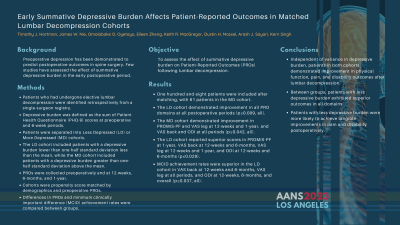Early Summative Depressive Burden Affects Patient-Reported Outcomes in Matched Lumbar Decompression Cohorts
Early Summative Depressive Burden Affects Patient-reported Outcomes in Matched Lumbar Decompression Cohorts
Friday, April 21, 2023


James W. Nie, BS (he/him/his)
Medical Student
University of Illinois College of Medicine
Chicago, Illinois, United States
ePoster Presenter(s)
Introduction: Preoperative depression has been demonstrated to predict postoperative outcomes in spine surgery. Few studies have assessed the effect of summative depressive burden in the early postoperative period.
Methods: The summative depressive burden of patients who underwent elective lumbar decompression was defined as the arithmetic sum of PHQ-9 scores at preoperative/6-week periods. Patients were separated into two cohorts: Less Depressed (LD) or More Depressed (MD). The LD cohort included patients with a depressive burden lower than one-half standard deviation less than the mean. The MD cohort included patients with a depressive burden greater than one-half standard or more above the mean. PROs included PROMIS-PF/VAS back/VAS leg/ODI and were collected preoperatively and at 12-week/6-month/1-year periods. Cohorts were propensity score matched by baseline demographics and preoperative PROs.
Results: After matching, 108 patients were included with 61 patients in the MD cohort. Acute postoperative pain was greater in the MD cohort. The LD cohort demonstrated improvement in all PRO domains at all postoperative time points (p≤0.009, all). The MD cohort demonstrated improvement in PROMIS-PF and VAS leg at 12-weeks/1-year, and VAS back and ODI at all periods (p≤0.042, all). The LD cohort reported superior scores in PROMIS-PF at 1-year, VAS back at 12-weeks/6-month, VAS leg at 12-weeks/1-year, and ODI at 12-weeks/6-months (p≤0.029). MCID achievement rates were superior in the LD cohort in VAS back at 12-weeks/6-months, VAS leg at all periods including overall, and ODI at 12-weeks/6-months as well as overall (p≤0.037, all).
Conclusion : Independent of variance in depressive burden, both cohorts demonstrated marked improvement in physical function, pain, and disability outcomes after lumbar decompression. Between groups, patients with a lesser depressive burden exhibited superior outcomes in all domains in raw outcomes scores. Additionally, patients with a lesser depressive burden were more likely to achieve clinically tangible improvements in pain and disability throughout the postoperative period.
Methods: The summative depressive burden of patients who underwent elective lumbar decompression was defined as the arithmetic sum of PHQ-9 scores at preoperative/6-week periods. Patients were separated into two cohorts: Less Depressed (LD) or More Depressed (MD). The LD cohort included patients with a depressive burden lower than one-half standard deviation less than the mean. The MD cohort included patients with a depressive burden greater than one-half standard or more above the mean. PROs included PROMIS-PF/VAS back/VAS leg/ODI and were collected preoperatively and at 12-week/6-month/1-year periods. Cohorts were propensity score matched by baseline demographics and preoperative PROs.
Results: After matching, 108 patients were included with 61 patients in the MD cohort. Acute postoperative pain was greater in the MD cohort. The LD cohort demonstrated improvement in all PRO domains at all postoperative time points (p≤0.009, all). The MD cohort demonstrated improvement in PROMIS-PF and VAS leg at 12-weeks/1-year, and VAS back and ODI at all periods (p≤0.042, all). The LD cohort reported superior scores in PROMIS-PF at 1-year, VAS back at 12-weeks/6-month, VAS leg at 12-weeks/1-year, and ODI at 12-weeks/6-months (p≤0.029). MCID achievement rates were superior in the LD cohort in VAS back at 12-weeks/6-months, VAS leg at all periods including overall, and ODI at 12-weeks/6-months as well as overall (p≤0.037, all).
Conclusion : Independent of variance in depressive burden, both cohorts demonstrated marked improvement in physical function, pain, and disability outcomes after lumbar decompression. Between groups, patients with a lesser depressive burden exhibited superior outcomes in all domains in raw outcomes scores. Additionally, patients with a lesser depressive burden were more likely to achieve clinically tangible improvements in pain and disability throughout the postoperative period.
